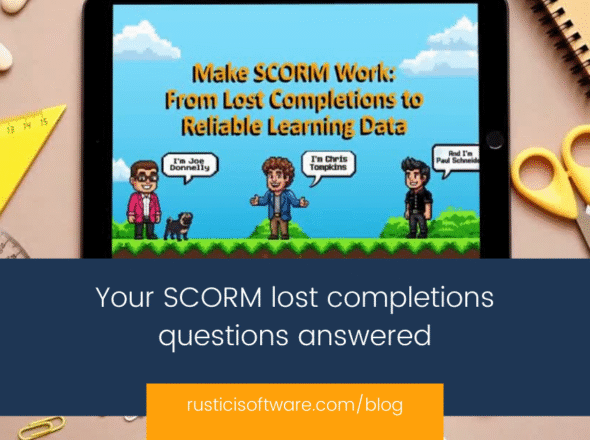This blog post is part of our “Ask Andy” series in which we publish Andy’s plain-spoken, straight shooting answers to common or uniquely interesting (eLearning) questions. If you have a question, you can always fill out this form and ask Andy too.
Hi Andy,
Customers using my learning platform want to upload courses in the SCORM standard. The requests are mounting so much that my team needs to consider adding support. I know that having SCORM will help us get more sales, and help our customers get the learner data they want. Through a quick search, I’ve learned that SCORM isn’t the only standard out there. I don’t want to spend all my developer hours building one standard just to fall down the rabbit hole of needing to support several. I’d like to find more resources on different learning standards to figure out if I need to build them into my application. Can your team help with this?
Sincerely,
Standard Deviation
Dear Standard Deviation,
We can absolutely help. While SCORM is still the standard most commonly supported today, your customers may ask for others like AICC, cmi5, LTI or xAPI. On top of that, customers may want to share non-standard content to track the same learner data from MP4s, MP3s, URLs or PDFs. Your question about learner data collection is spot on as that is a key factor in your decision.
SCORM
This is the most universal and basic of the eLearning standards. There are a few different flavors of SCORM. First, there is SCORM 1.2, which captures completion, score, duration, satisfaction, and basic-but-limited interaction data (e.g. question/answer details.). Then there are three versions of SCORM 2004 (2nd, 3rd and 4th Editions). SCORM 2004 3rd Edition is the most commonly supported. Along with the data collected by SCORM 1.2, SCORM 2004 is best to use if you have a lot of interaction data. It also supports sequencing and navigation for more sophisticated course design. SCORM.com is a great place to start as you navigate through the SCORM standard.
SCORM resources:
xAPI
xAPI is an eLearning specification that makes it possible to collect data about the wide range of experiences a person has within online and offline training activities. xAPI.com, can help you learn more and these pages are a terrific introduction to the standard.
xAPI resources:
cmi5
cmi5 provides a way to move from SCORM to the more modern xAPI specification. The specification gives you the best of both worlds by having the flexibility of xAPI to track virtually any type of learning activity and the structure of SCORM that learning technologies and systems have historically relied upon.
cmi5 resources:
LTI
LTI, or Learning Tools Interoperability, is another standard that helps your customers get the learner data they need from your application. This is necessary if you’re selling your product within the higher education or EdTech market, but it is also seeing adoption across the corporate space.
LTI resources:
AICC
AICC supports cross-domain inherently, meaning you can host content on your servers if you prefer. Data collected mirrors SCORM 1.2. This standard, however, is now defunct and tools that support AICC are not as prevalent. If you want to read more about the AICC standard, start here.
Build versus buy: Choose the path best suited for your team
If you’re considering building your own solution, you will have to dedicate developer hours to implementing support for one standard. Other customers of ours have estimated SCORM support to take about a year to build out. Depending on customer urgency, the timing may be longer than you expect.
If you are considering purchasing software that integrates with your application to import, play and track content in every common learning standard, then take a look at Rustici Engine. Engine does a great job at supporting standards-based content, plus non-standard documents and media. If you need a solution that you can build into your application that helps distribute content as well, check out SCORM Cloud API. Please let me know if you’d like to learn more about the Rustici products that support every common learning standard.
Thanks,
Andy


